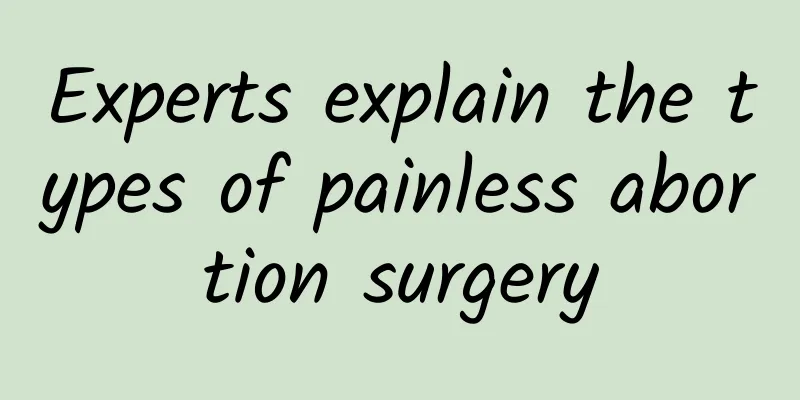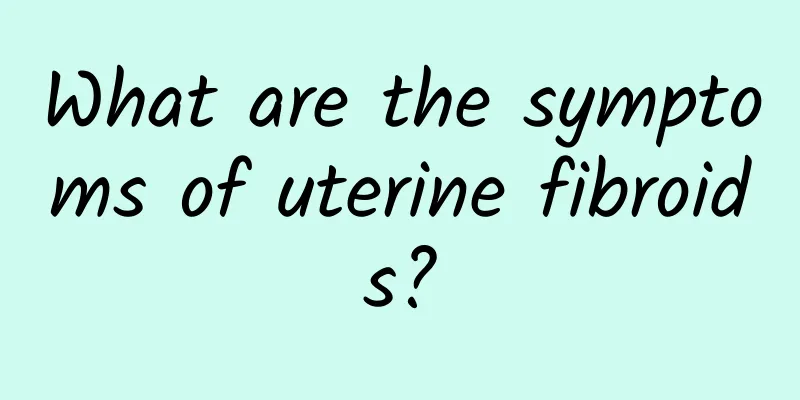When will uterine fibroids be removed? When will uterine fibroids be removed?

|
Under what circumstances will uterine fibroids be removed? Uterine fibroids are one of the most common tumors in the female reproductive organs. They are usually benign, but in some cases they may cause some discomfort and complications. So, when would you consider removing uterine fibroids? 1. Heavy bleeding Uterine fibroids may cause menorrhagia or abnormal menstrual cycles, resulting in heavy bleeding. In this case, if drug treatment is ineffective or the side effects of the drugs are large, the doctor may recommend removal of the uterine fibroids. Heavy bleeding not only causes anemia, but also has adverse effects on women's health and quality of life. 2. Infertility or recurrent miscarriage Uterine fibroids can cause infertility or recurrent miscarriage, especially if they are located in the uterine cavity or put pressure on the endometrium. If the fibroids affect the shape of the uterus or prevent the fertilized egg from implanting, doctors may consider removing the fibroids to improve pregnancy rates. 3. Compression of surrounding organs Uterine fibroids may compress surrounding organs as they grow. Especially when the fibroids grow to a certain size, they may compress the bladder, causing frequent urination, urgency, or difficulty urinating; they may also compress the rectum, causing difficulty defecation or constipation. In this case, the doctor may decide to remove the uterine fibroids to relieve symptoms and improve the patient's quality of life. 4. Rapid enlargement or suspected malignant transformation Most uterine fibroids grow slowly, but in some cases they may grow rapidly. If a uterine fibroid grows rapidly in a short period of time, or there is a possibility that the fibroid will become malignant, the doctor will recommend removing the uterine fibroid to rule out the possibility of malignancy. 5. Long-term pain or compression symptoms When uterine fibroids cause long-term abdominal pain or pressure in the lower abdomen, your doctor may consider removing the fibroids. The pain may interfere with your daily life and work, and severe pressure symptoms may affect your quality of life. Removing the fibroids can relieve symptoms and improve your quality of life. Uterine fibroids are common tumors in women, most of which are benign. However, in some cases, such as heavy bleeding, infertility or recurrent miscarriages, compression of surrounding organs, rapid enlargement or suspected malignant transformation, and long-term pain or compression symptoms, doctors may recommend removal of uterine fibroids. Each patient's situation is different, so when facing the decision of surgery, a comprehensive assessment of the individual's condition should be conducted and the decision should be made based on the doctor's advice. |
>>: What is the difference between uterine cyst and fibroids? Which one is more serious?
Recommend
Spondylolisthesis can be cured by three methods of left and right rotation through rehabilitation
As the weather turns cooler, the number of patien...
What are the dangers of Bartholinitis?
The Bartholin's glands are located at the bac...
What is a menstrual belt?
Menstrual belts are actually a little helper for ...
What to use to clean vulva itching
Vulvar itching may be caused by a variety of reas...
Muscle strength alarm? Jian Wenren makes a move! Muscle-nourishing exercises to prevent aging, prevent falls and protect the brain
The weather has been cold recently and no one lik...
Is dysmenorrhea related to ovarian cysts? What are the dangers?
Is dysmenorrhea related to ovarian cysts? What ar...
There are tips for lazy people to lose weight! Massage the liver and gallbladder meridian before bed
Want to lose weight but worried about the difficu...
Eat for a good pregnancy! Eat more spinach and salmon to help pregnancy, remember 5 do's and 3 don'ts
What should I eat if I want to get pregnant? What...
Hot summer iced coffee mines: one cup is equal to two bowls of rice
In the hot summer, people stay in air-conditioned...
What should I do if I have pelvic inflammatory disease?
What should you do if you have pelvic inflammator...
How do women take care of cervical warts?
Cervical warts are a very common disease. Althoug...
Will 10,000 steps a day make you thinner? 5 weight loss concepts that will subvert your thinking
What would you do to combat obesity? Many people ...
Will I have menstruation if I have an ectopic pregnancy?
Whether or not an ectopic pregnancy will cause me...
Five common causes of menstrual cramps
Dysmenorrhea can seriously affect people's no...
What are the symptoms of heavy bleeding after medical abortion? There are 4 major symptoms
In real life, some women have to choose to termin...









